|
By SIR IAIN COLQUHOUN, Bt.,
D.S.O., Chieftain, Lord-Lieutenant of Dumbartonshire
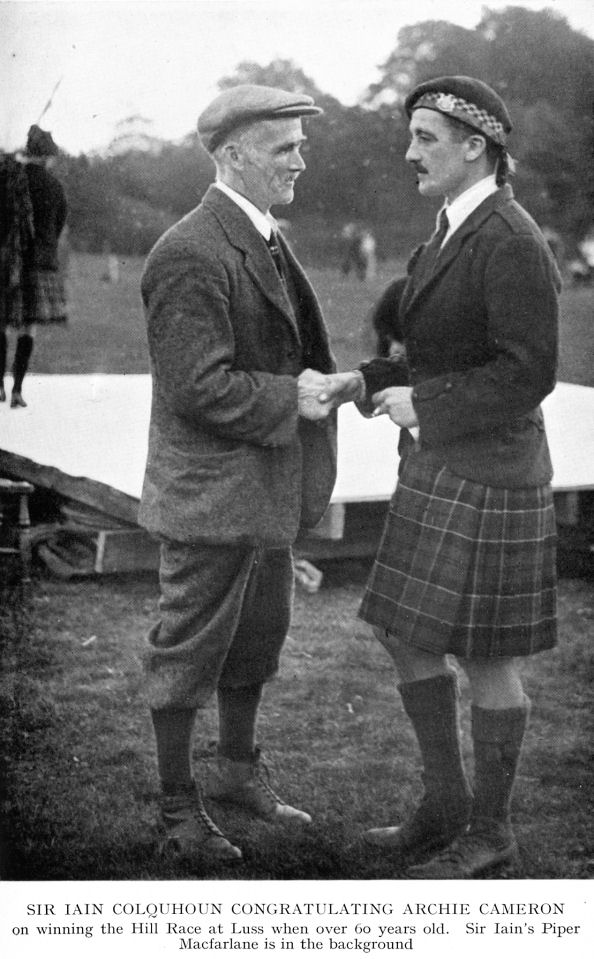
The Luss Highland Gathering affords an
excellent example of. one of the smaller gatherings which, although
largely local in the matter of attendance, became widely known for the
excellent sport it provided, and for the presence of the most famous
athletes from every part of Scotland.
The first gathering, held
in 1875, owed its inception to the enthusiasm of several farmers and local
sportsmen, all of whom belonged to the Luss Company of the Dumbartonshire
Volunteers. This Company, clad in the Colquhoun tartan, and commanded by
Geordie Colquhoun (Shemore), was a very popular and efficient unit of the
battalion.
The Committee included
Messrs. Geordie Colquhoun, James Lennox, Wm. MacGregor, John Galbraith and
Robert McNab, with James MacIndoe as Secretary and Sir James Colquhoun of
Luss as Chief. The Committee was a very influential one, all its members
being well known and greatly respected men.
The first Saturday in
September was selected for the date, and the games proved an unqualified
success; the presence of the noted athlete, J. Fleming, who won all the
open heavy events, added greatly to the interest of the day.
The games, which were well supported by shooting tenants and other local
gentlemen, were held for three years in a field north of the River Luss,
but as they became rapidly very popular, the site was changed to the
larger field on the south side, where they have been held ever since.
A more beautiful or romantic position for a Highland gathering could
hardly have been chosen. The River Luss bounds one side with Loch Lomond
in the background, whilst the wooded policies of Camstraddan and the
rugged Luss Hills (up which the shepherds scramble in their annual race)
complete a picture with which Doctor Johnson himself could hardly have
found fault.
I have been greatly touched by the appreciation of the scenery which
athletes from far and near have shown. Few of them to whom I have spoken
but have expressed to me their pleasure in competing in such an ideal
spot.
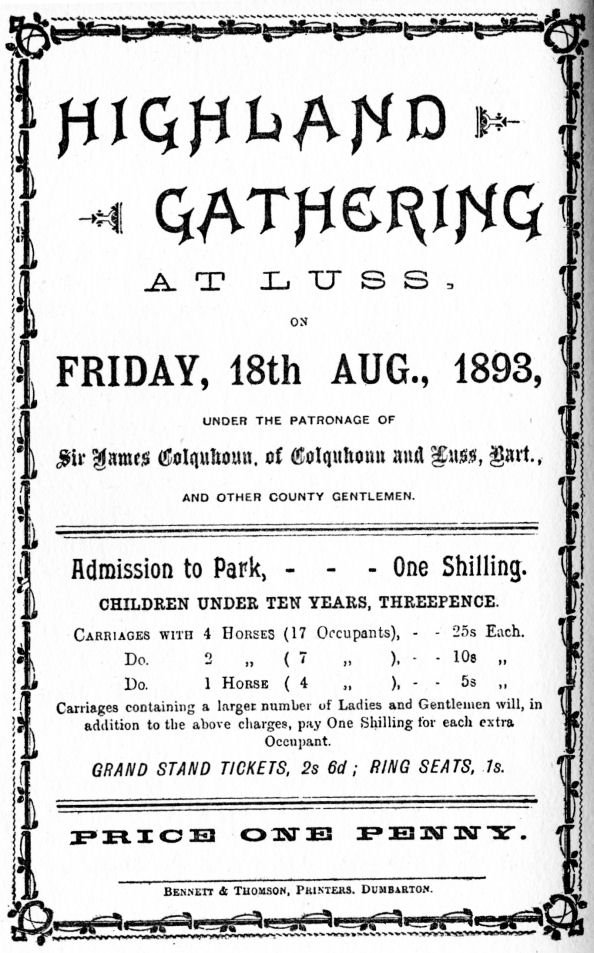
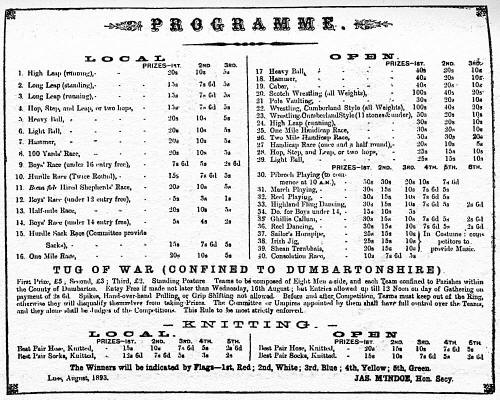
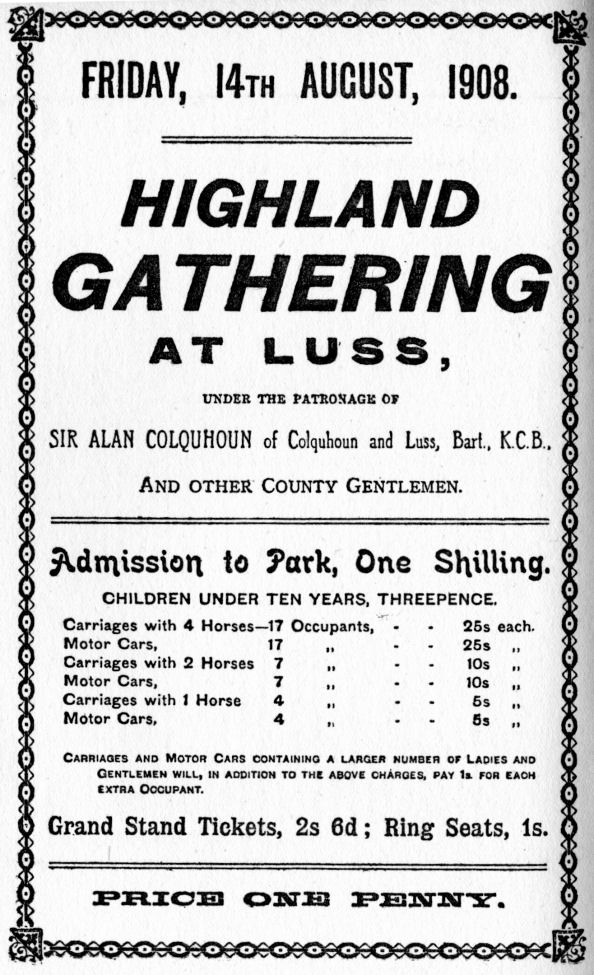
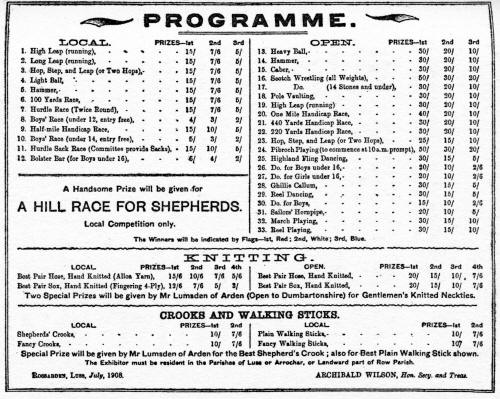
In the early days the
Gathering was naturally for all the local people the great day of the
year, and from early morn, from hill and glen, the farmers and shepherds
would make their way to the village on foot, horseback, or in farm cart;
to be reinforced at a later hour by every form of vehicle from the
four-in-hand brake to the humblest type of "machine," whilst the crude
English tongue would be almost superseded by the infinitely more beautiful
Gaelic.
On arrival at the ground
all vehicles were parked in a circle round the roped enclosure, and it is
on record that at one meeting the circle was three deep. The occupants had
therefore a comfortable seat and an excellent view of the sports field.
Prices were charged on a basis of so much for a two-horse and so much for
a four-horse machine. At one gathering a large four-horse brake from the
Vale of Leven drew up before reaching the ground, unyoked two horses, and
attempted to enter the field at the lower price. On this being reported to
Geordie Colquhoun, he expressed himself with such fluency that the driver
was heard voicing the opinion that the only two-horsed vehicle which could
get in unchallenged would be Elijah's chariot.
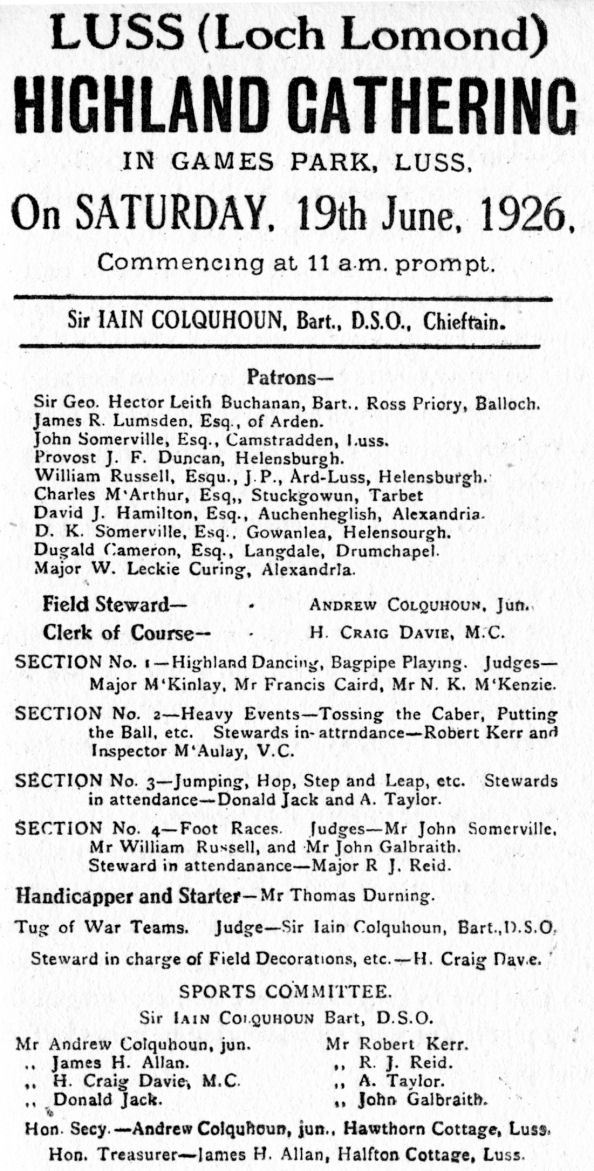
All the great Highland
athletes competed at one time or another at Luss, but the one who holds
the highest place in the hearts of his countrymen, from whence he will
never be dethroned, is Donald Dinnie.
His first appearance at Luss created great interest, and I have heard many
of the older men of the village affirm that Dinnie in those days was the
finest specimen of manhood they had ever seen. From caber to high jump it
was all the same to Donal'. One of his little affectations was to handicap
himself by performing the high jump in the kilt. On one occasion, having
knocked the cross-bar down on two successive attempts, he hurled his "philabeag"
to the ground and soared over at his third effort clad only in an
extremely abbreviated pair of tartan trews.
Wrestling was always a
great feature of the Gathering, and the styles of Steadman, Currie, Alec
Munro and other giants of the game were well known to the Luss people,
whilst the famous exponents of the hammer, ball and caber from A. A.
Cameron downwards have competed regularly there.
The games field is not very
suitable for running, being rough and hummocky, but great runners like
McLeavey (Vale of Leven), champion at any distance from one to ten miles,
and after him Peter Cannon of Stirling, have often delighted the Luss
audience by the ease and grace of their movements.
Among the great masters of
our national instrument, no names are held in higher esteem in Luss than
those of John McColl and MacDougall Gillies, and when their competing days
were past, their presence as judges inspired and encouraged the young
pipers who were endeavouring to follow in their footsteps.
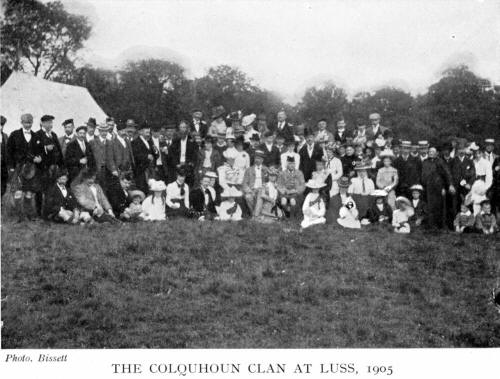
The year 1896 is a black one in the annals of
the Gathering, for when the great day arrived a perfect deluge descended.
At eleven a.m. the ground was flooded and there were two feet of water
round the marquees. The sports were abandoned and a spirited argument
ensued with the competitors, who demanded their money back. A man was seen
escaping from beneath the luncheon tent with a large boiled salmon under
his arm. On being challenged by the police, he explained he had killed it
with a stick under the grandstand.
A military band was
generally in attendance, and in some years a company of the Maryhill
Garrison would perform gymnastics, etc.
In the local competitions a
high standard was always maintained, and names far too numerous to mention
are well remembered in the parish.
Among the more prominent
were A. Jardine and John Jardine, John MacFarlane, John Stewart, Willie
McCallum, Dugald McCallum and the Cameron Brothers from Glen Luss -
Willie, James and Archie.
Archie competed regularly
in many races for over thirty years, and in 1925 won the hill race when
over sixty. He carries a medal presented by the Committee of the Luss
Gathering commemorating his long and successful record as a competitor.
Sometimes a competition in
Gaelic singing would take place, in which John McColl (Oban) and Donald
McInnes and Duncan McCorquodale, both local, were prominent. There was
also a competition for the best made shepherd's crooks, in which Willie
McCallum (Tarbet) and Willie McCallum (Luss) invariably carried all before
them.
A feature of the Gathering
was the luncheon to which the chief, Sir James Colquhoun, entertained his
clansmen and their friends. They were piped into the large marquee by the
most successful piper, generally John McColl. It was largely attended, as
the Colquhouns are one of the few clans who have never left their own
country, and to this day I do not think I should be far wrong in saying
there are as many of that name in the parish of Luss as in the rest of
Scotland.
A familiar and greatly
loved figure at the gatherings was "Daft Tosh." Tosh thought he was a
police officer, and the kindly village constables would give him any
cast-off police clothing, helmets, etc., they could lay hands on. During
the year Tosh would keep copious notes of any misdemeanours which occurred
in the village. At the Gathering the Chief Constable invariably had him
summoned into the ring, where, after inspecting the notebook, he publicly
congratulated Tosh on the fine order he had maintained in the village. A "prood
man" was Tosh that day. He died many years ago, lamented by all.
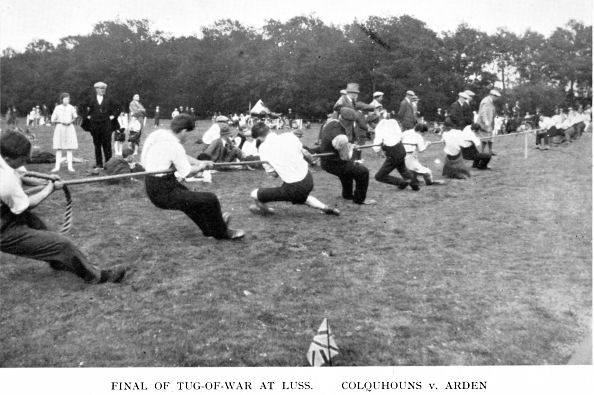
The two chief judges for
many years were Peter Weir and Chief Constable McHardy. Two finer types of
Highland gentlemen could not be found. Fluent Gaelic speakers, with the
love of their country as the great impetus of their lives, they were
beloved and respected wherever they went.
On the retirement of James
MacIndoe as secretary, the duties were taken over by James Wilson of
Rossarden. His enthusiasm and keenness knew no bounds, and for many years
he was the moving spirit in all that pertained to the good of the
Gathering. On the death of Sir James Colquhoun, the post of chieftain was
taken over by Sir Alan Colquhoun, who took a warm interest in the Annual
Gathering.
The Loch Lomond steamboats
are the main means of transit to and from Luss. In 1912 they refused to
run special steamers for the Gathering unless a large number of passengers
were guaranteed. The Committee could not see their way to accede to this
demand, and the Gathering remained in abeyance from 1912 until 1921,
having run continuously since 1875, a period of thirty-six years.
The old minute books and
records referring to the Luss Gathering have unfortunately been lost, and
for much of the earlier information I am indebted to my friends, Andrew
Colquhoun, John McKellar, Sandy McInnes, John MacFarlane and Donald
MacFarlane, all of Luss, whose courtesy and accurate memories have enabled
me to tabulate much of interest which would otherwise have been lost sight
of.
The largest attendance
recorded was just over four thousand.
After the war a post of the
British Legion was formed in Luss, and in 1922 the Committee of the post
inaugurated a local sports meeting, which, in spite of a postponement
owing to bad weather, proved very successful.
Encouraged by this success
the Committee determined to resuscititate the Luss Gathering, and with
this object in view sent round an appeal for subscriptions. A splendid
response was met with, the farmers and people of the parish subscribing
most generously.
In 1923 the competitions
were reserved to the parishes of Luss, Arden, Glen Fruin, and Arrochar,
with an open class for juvenile dancing and piping.
The following year the
programme was greatly extended, eighteen events being thrown open to the
County of Dumbarton.
The Committee, which
included Sandy Taylor, Donald Jack, Reverend A. S. Dunlop, A. Reid, Robert
Kerr, Harry Davie (treasurer), Andrew Colquhoun, junior (secretary) and
Sir lain Colquhoun, chieftain, all ex-service men, now felt themselves in
a position to promote the open gathering. This, therefore, took place on
June 20th, 1925, and proved in every way a success. There were seventeen
open events, sixteen events confined to, nine parishes, and nine juvenile
events confined to Luss.
The Gathering in 1926 was
held on the 19th June, and suffered in attendance on account of the coal
strike. The Loch Lomond steamers were not running, and the audience of
about two thousand was conveyed largely by chars-à-bancs.
In these two years the
games were notable for the keen competitions in the open heavy events, and
there was probably a finer selection of prominent Highland athletes
competing at Luss than at any other Highland gathering.
The present Committee,
which consists of Harry Davie, Robert Kerr, Sandy Taylor, Donald Jock,
John Galbraith, Andrew Colquhoun (secretary), James Allan (treasurer), and
Sir lain Colquhoun (chieftain), have given every encouragement to local
athletes, and the confined events are always keenly contested.
At the last two gatherings
Constable A. Weir (Renton) gave a splendid display in the heavy events,
carrying off prizes in both open and confined competitions, whilst Douglas
McGibbon, George Taylor, Peter Cameron and Sinclair Colquhoun, all of Luss,
show great athletic promise.
A feature of the games in
1924 was the tug-of-war, in which a team of eight Colquhouns, all from the
parish of Luss, headed by their chief and captained by Andrew Colquhoun,
J.P., were only defeated in the final by a highly trained team from Arden.
The management of every
Highland gathering has many difficulties to compete with at the present
time. There are many other attractions; it is hard to avoid a clashing of
dates, and the entertainment tax falls very heavily upon the smaller ones.
In spite of these
difficulties the Luss Games retain their hold on popular affection and are
splendidly supported by the local people.
The Committee organizes an
annual Highland concert and annual Highland ball, and these are eagerly
looked forward to.
Their great ambition is to
preserve the old customs and the old character of the games, and to see
that the modern Luss Highland Gathering shall be in no way inferior to the
famous meetings in the past. |

